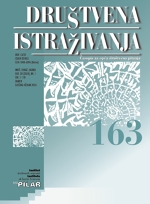AKULTURACIJSKA OČEKIVANJA HRVATSKIH UČITELJA OD UČENIKA IZBJEGLICA: ULOGA ETNIČKOG IDENTITETA, EMPATIJE, ME\UGRUPNOGA KONTAKTA I ŠKOLSKE KLIME
ACCULTURATION EXPECTATIONS OF CROATIAN TEACHERS FROM REFUGEE STUDENTS: THE ROLE OF ETHNIC IDENTITY, EMPATHY, INTERGROUP CONTACT AND SCHOOL CLIMATE
Author(s): Filip Gospodnetić, Dinka Čorkalo BiruškiSubject(s): School education, Educational Psychology, Migration Studies, Ethnic Minorities Studies, Inclusive Education / Inclusion, Sociology of Education
Published by: Institut društvenih znanosti Ivo Pilar
Keywords: acculturation; acculturation expectation; refugee students; empathy;
Summary/Abstract: The aim of this research conducted on a sample of 163 teachers from elementary schools in Zagreb attended by refugee students was to assess the individual contribution of ethnic identity, general and ethnocultural empathy, direct contact and school climate on teacher's acculturation expectations from refugee students. The first hypothesis stated that ethnic identity would be negative, while general and ethnocultural empathy, contact and school climate would be positive predictors of integration expectations. The second hypothesis stated that all the predictors would negatively predict assimilation expectations. The results indicate that increased ethnocultural empathy and school climate predict increased expectation of integration, while contrary to the hypothesis, increased school climate positively predicts acculturation expectations of assimilation. The research's insights indicate that ethnocultural empathy and school climate can explain intergroup relations between Croatian teachers and refugee students and can help in preparing Croatian teachers for teaching refugee students.
Journal: Društvena istraživanja - Časopis za opća društvena pitanja
- Issue Year: 33/2024
- Issue No: 1
- Page Range: 79-100
- Page Count: 22
- Language: Croatian

